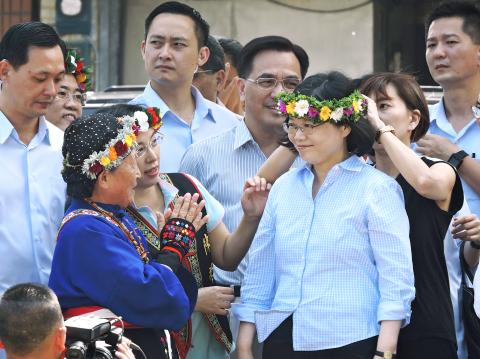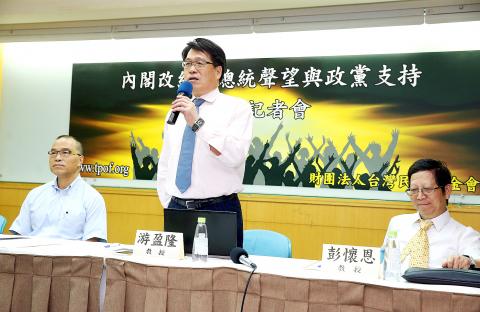President Tsai Ing-wen’s (蔡英文) approval rating has risen by 16.6 percentage points to 46.4 percent following the Cabinet reshuffle, a rare comeback considering her rating had been below 30 percent.
The Taiwanese Public Opinion Foundation’s latest monthly poll, released yesterday, found that Tsai’s approval rating has rebounded from 29.8 percent last month to 46.4 percent this month, while her disapproval rating fell from 50 percent to 36.4 percent.
The reversal is attributed to the Sept. 8 Cabinet reshuffle by Premier William Lai (賴清德), following former premier Lin Chuan’s (林全) resignation.

Photo: Chang Tsun-wei, Taipei Times
“About 20 percent of disappointed supporters have turned around as they realized that Tsai Ing-wen, rather than being incurably stubborn and incapable, could still make wise decisions at critical moments,” foundation chairman You Ying-lung (游盈隆) said.
The reshuffle was approved by 69 percent of respondents, while 17.5 percent disapproved.
Lai is one of the most popular politicians in the nation, having scored 63.44 on the “feeling thermometer,” which is gauged between zero and 100, compared with Tsai’s 59.67 and former president Ma Ying-jeou’s (馬英九) 57.6 when Tsai and Ma were running in the 2012 presidential election.

Photo: CNA
Only Taipei Mayor Ko Wen-je (柯文哲), who scored 66.75, could compete with Lai, You said.
Tsai’s rebound indicates that the public has high expectations for Lai, but if he fails to achieve tangible results in the short term, the disappointment could be equally high, National Dong Hua University professor Shih Cheng-feng (施正鋒) said.
Shih Hsin University journalism professor Peng Huai-en (彭懷恩) said he thought that Lai’s popularity would wane if he has conflicts with Tsai, since most of Lai’s Cabinet members are holdovers from Lin’s, who were selected by Tsai in the first place and who caused support for Lin’s Cabinet to fall.
However, National Chengchi University professor Yeh Kuang-shih (葉匡時) said that Lai could maintain his popularity if he is able to smoothly cooperate with Tsai and the Democratic Progressive Party (DPP) caucus because the public has grown indifferent to politics and has generally low expectation of Tsai’s administration, and because the Chinese Nationalist Party (KMT) has proven to be an incapable opposition party.
“The inability to revive the economy is the greatest challenge facing the new Cabinet, which lacks the talent needed to reform the country’s economy and industrial structure,” Yeh said.
The amendment to the Labor Standards Act (勞動基準法) that led to the “one fixed day off and one flexible day off” workweek policy — revision of which is considered a priority for Lai — was disapproved of by 60.1 percent of respondents, the highest disapproval rate since the policy was announced in December last year. It was supported by 27.8 percent of the respondents.
Disapproval of each of the five branches of government far exceeds their approval rating with the exception of the Executive Yuan, of which 47.8 percent of respondent disapproved of and 39.6 percent approved.
Meanwhile, the poll indicates that the smaller parties are increasingly being marginalized.
While 30.2 percent of the respondents said they supported the DPP and 18.9 percent supported the KMT, only 6.4 percent supported the New Power Party (NPP) and 2.9 supported the People First Party, while 38.2 percent said they did not support any party in particular.
“The support for the KMT has dropped to its lowest since it came to Taiwan, and the NPP, which had a 15 percent support rate in July last year, is only a short way away from the 5 percent threshold [of legislator-at-large seats], suggesting the marginalization of small parties,” You said.
The Legislative Yuan received a 61.1 percent disapproval rating and a 29.5 percent approval rating.
Of the other branches, the Judicial Yuan’s ratings are 58.7 percent and 24.3 percent respectively; the Examination Yuan’s were 43.6 percent and 29.9 percent respectively and the Control Yuan’s were 55.3 percent and 24.6 percent respectively.
According to 53.6 percent of the respondents, the constitutional separation of the five powers should be revised, while 29.3 percent said it was unnecessary.
While 41.3 percent of the respondents said that former president Chen Shui-bian (陳水扁), who has served more than six years of a 20-year prison term for corruption, did not receive a fair trial, 37.1 percent said he did.
The poll was conducted on Monday and Tuesday last week and collected 1,074 samples with a margin of error of 2.99 percentage points.

SECURITY: As China is ‘reshaping’ Hong Kong’s population, Taiwan must raise the eligibility threshold for applications from Hong Kongers, Chiu Chui-cheng said When Hong Kong and Macau citizens apply for residency in Taiwan, it would be under a new category that includes a “national security observation period,” Mainland Affairs Council (MAC) Minister Chiu Chui-cheng (邱垂正) said yesterday. President William Lai (賴清德) on March 13 announced 17 strategies to counter China’s aggression toward Taiwan, including incorporating national security considerations into the review process for residency applications from Hong Kong and Macau citizens. The situation in Hong Kong is constantly changing, Chiu said to media yesterday on the sidelines of the Taipei Technology Run hosted by the Taipei Neihu Technology Park Development Association. With

CARROT AND STICK: While unrelenting in its military threats, China attracted nearly 40,000 Taiwanese to over 400 business events last year Nearly 40,000 Taiwanese last year joined industry events in China, such as conferences and trade fairs, supported by the Chinese government, a study showed yesterday, as Beijing ramps up a charm offensive toward Taipei alongside military pressure. China has long taken a carrot-and-stick approach to Taiwan, threatening it with the prospect of military action while reaching out to those it believes are amenable to Beijing’s point of view. Taiwanese security officials are wary of what they see as Beijing’s influence campaigns to sway public opinion after Taipei and Beijing gradually resumed travel links halted by the COVID-19 pandemic, but the scale of

A US Marine Corps regiment equipped with Naval Strike Missiles (NSM) is set to participate in the upcoming Balikatan 25 exercise in the Luzon Strait, marking the system’s first-ever deployment in the Philippines. US and Philippine officials have separately confirmed that the Navy Marine Expeditionary Ship Interdiction System (NMESIS) — the mobile launch platform for the Naval Strike Missile — would take part in the joint exercise. The missiles are being deployed to “a strategic first island chain chokepoint” in the waters between Taiwan proper and the Philippines, US-based Naval News reported. “The Luzon Strait and Bashi Channel represent a critical access

Pope Francis is be laid to rest on Saturday after lying in state for three days in St Peter’s Basilica, where the faithful are expected to flock to pay their respects to history’s first Latin American pontiff. The cardinals met yesterday in the Vatican’s synod hall to chart the next steps before a conclave begins to choose Francis’ successor, as condolences poured in from around the world. According to current norms, the conclave must begin between May 5 and 10. The cardinals set the funeral for Saturday at 10am in St Peter’s Square, to be celebrated by the dean of the College